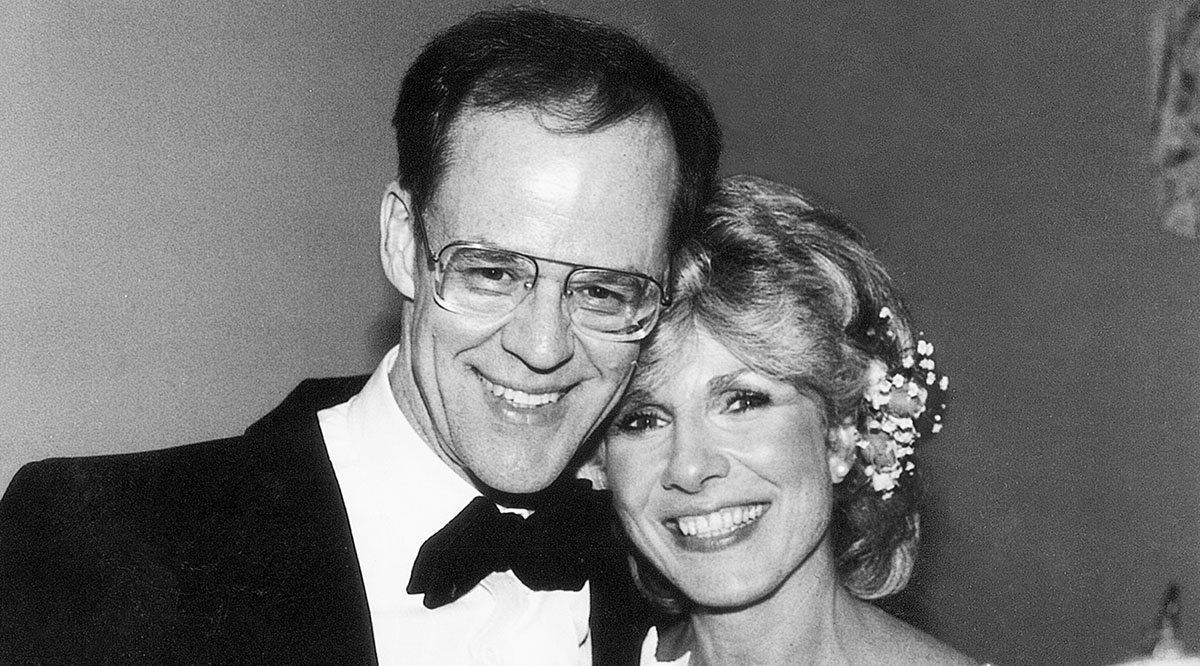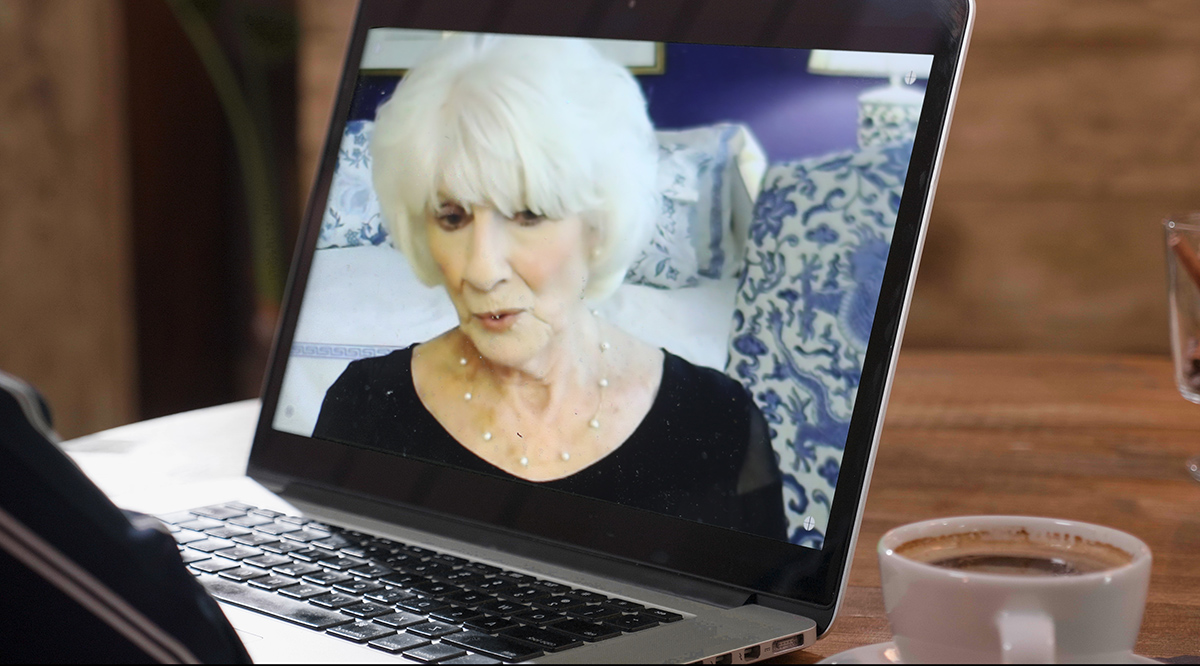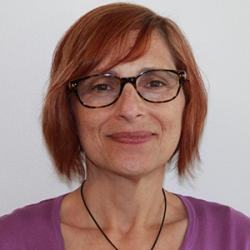
Diane Rehm is determined that no patient should have to suffer the indignity her husband John experienced at the end of his life.
Ravaged by Parkinson’s disease, “he could no longer stand on his own, he could no longer toilet himself, he could no longer feed himself,” the celebrated NPR host explained to listeners at Learn Serve Lead 2020: The Virtual Experience, the AAMC’s annual meeting, on Nov. 16.

Yet John’s only legal option was to refuse to eat or drink. “It took him 10 long days to die. Nobody should have to endure that,” said Rehm, who went on to author When My Time Comes, an in-depth exploration of the issues surrounding medical aid in dying.
Rehm wrote the book, which is based on an upcoming PBS documentary, to further her current quest: ensuring that more terminally ill people have the right to choose how they die.
Her cause is even more crucial now because of the pandemic, argued Rehm, who has won numerous awards over her career, including a Peabody Award and a National Humanities Medal.
“As we see so many [people] die of this virus, it makes us focus more on what it is we want at the end of life,” she said. “It may even spur more legislators to think [more] about the issue, which many of them have wanted to avoid at all costs.”
In a robust conversation with Timothy Quill, MD, a professor at the University of Rochester School of Medicine and Dentistry who has written extensively on end-of-life issues, Rehm told listeners that medical aid in dying is no simple matter. To qualify, patients must have six months or less to live and be able to self-administer the complex medical brew — and they must be deemed mentally competent.
A few weeks before her appearance at Learn Serve Lead, Rehm sat down with AAMCNews to share her insights into physicians’ feelings about death, how medical aid in dying differs from suicide, and even how she envisions her own final moments.
You’ve described John Rehm’s death as “excruciating to witness.” Why is that?
John and I had talked a lot about what each of us wanted at the end of life, and we agreed that we both wanted to pass away as peacefully as possible, without being attached to any kind of machinery that would keep us alive.
[He had gotten to the point where] he could no longer feed himself, stand on his own, toilet himself. One day I came in and he said, “Sweetheart, I've had enough. I cannot do any of the things I want to do. I'm ready to die.”
We talked with the doctor at the facility [in Maryland, where medical aid in dying is not legal]. He said, “I'm sorry. I cannot help you. The only thing you can do is to stop eating, stop drinking, stop taking any medications.”
The doctor promised John would not be in pain, but then I began seeing grimacing on his face. I told the doctor, so I think they gave him small doses of morphine. One night, two aides came in to turn him over, and I asked why. They said, "So he won’t get bedsores," and I thought, "At this point, why are you disturbing the poor fellow?"
To watch someone you love and have lived with for 54 years move into and linger in that state is awful. Those last 10 days were agonizing, truly agonizing.
Your mother died from cancer at a young age, which also influenced your thinking on end-of-life issues. Can you talk a bit about that and your support of medical aid in dying?
I saw my mother suffer for a prolonged period. She was in active pain the whole time at the end — no medication would touch it — and she would just beg to die. Then seeing John go through this, it was awful, just awful.
As a resident of the District of Columbia, I feel so fortunate because D.C. allows medical aid in dying. A physician must deem that you are within six months of death, and that physician has to be corroborated by a second physician.
Legislators in the nine states plus D.C. that allow medical aid in dying have put so many safeguards into place. When the individual decides that enough is enough, they must be able to self-administer the medication. There has not been — even in Oregon where they’ve had right to die for more than 20 years — there has not been a single case brought to the court saying that this was done illegally or forced on this person or anything of that sort.
Why do you believe hospice and palliative care don’t provide enough relief for some patients?
Some palliative care doctors believe that all you need to do is to keep a patient comfortable and then they will not wish to die. Other doctors say there is some pain that palliative care cannot touch.
But pain is not the number one reason that individuals choose to end their suffering. It is lack of dignity or joy in life. My husband felt he had lost dignity and that if he continued to live it would go down even further, and he was a very proud man.
Is medical aid in dying different from assisted suicide?
Yes. Medical aid in dying is for those who are dying. That is why we do not refer to it as medically aided suicide. These people don't want to die, but they are dying. John Rehm’s death certificate says he died of Parkinson’s disease [and not suicide].
I talked to a young woman who had breast cancer that had completely spread throughout her body. She was 37 years old. She said, “If I had my druthers, I would live until I was 90. I don't choose to die. I choose to live, but I know I'm going to die, and I don't want to die suffering and having my children see me suffer.”
What are some of the concerns of people who oppose medical aid in dying?
We know that 70% of Americans support medical aid in dying. However, there are those who have very strong religious beliefs, who believe that only God should be the ultimate decider. There are also those who have ethical beliefs, feeling that no one should end their lives under any conditions.
I believe that if you want God to be the only decider, that's wonderful. That's what you should have. If you have ethical reasons that you believe you should not take your own life, I think that's fine, and I support you.
I think each person should make that choice. I would not dream of foisting my choice on someone else. And I would like you also to respect my choice. Please do not foist your beliefs on me.
What about concerns that medical aid in dying will be used against people of color or people with disabilities?
When I talked with an AME [African Methodist Episcopal] minister in downtown Washington, we talked about the Tuskegee experiment and the fact that Black people have very little trust in the medical profession because of what has been done to them in the past.
The Reverend also said to me that when the time comes that we can show no Black man or woman would be coerced into taking his or her life, then he would support it. But right now, he said, with the way things are in this country, he would have a hard time supporting it — which is understandable.
Interestingly, those who have disabilities were divided, with some saying, “I am afraid that I would be considered useless and my life taken from me.” Others were saying, “Why did you not give me that same right? Why am I not allowed to use medical aid in dying if I cannot self-administer the medication and I wish to die?” So it's an interesting division.
Has the COVID-19 pandemic affected your thinking on end-of-life issues?
The first thing I did as the news unfolded about the use of ventilators was call my doctor. I said I will not be put on a ventilator.
She said, “If you begin having chest pains or difficulty breathing, we can set you up with oxygen at home, but not at the same level that we can in the hospital.” My thinking is that I don’t even want to go to a hospital.
So I have made my plans should I contract the virus. I am in a vulnerable category because of age. But when they were talking about how few ventilators they had available, I said, “Why in the world would I, an 83-year-old woman, want to take a ventilator from somebody who is 35, who has a whole life ahead?” So, that's my decision.
Do you think doctors are uncomfortable with death?
Doctors from the beginning have been trained to keep people alive. That means if a patient has cancer, for example, if one treatment doesn't work, they say, “We can always try this, or we can always try that.” But how often do doctors say, “If we give you this treatment, you may survive three months longer, but if we don't, you can go home now with your family and we will make you as comfortable as possible until the end”?
More and more doctors are beginning to understand that they have to listen to what their patients want, rather than simply abiding by the I-must-keep-you-alive oath that they perhaps made to themselves.
I wish we could talk about death more openly as part of the human journey that begins and ends. I hope that the book and the film spur discussions within families, among friends, and with physicians as to what people want.
Every one of us is going to experience death, so the question becomes, how do you wish to experience it? My children know exactly what I want. I feel very strongly that I want clarity for them and for me.
In your book, you ask interviewees what they consider to be a good death for themselves. What were some of their answers? What do you think would be a good death for you?
It was fascinating that no matter whether they were for or against medical aid in dying, almost every single person had something of the same answer. They wanted their families with them, and they wanted to be in their own bed. They hoped not to die in the hospital. They hoped it would be painless.
When my time comes, I will use medical aid in dying because I do not wish to have a joyless death. I hope to have my [current] husband, my children, my grandchildren, my dearest friends there with me, to have a glass of champagne, and then go quietly into my own bedroom with my family. I want to be able to say goodbye and tell them how much I love them, and then drift off.
The end of life is part of the cycle we are all in. I feel so lucky to have had the life I’ve had, the family I’ve had, and the career I’ve had, which I surely never expected to have.
Of course, I will be sad to leave this beautiful world — the stars and the sun and the flowers and my darling dog and my sweet husband to whom I've been married now for almost three years and my beautiful family. But death does not frighten me.
